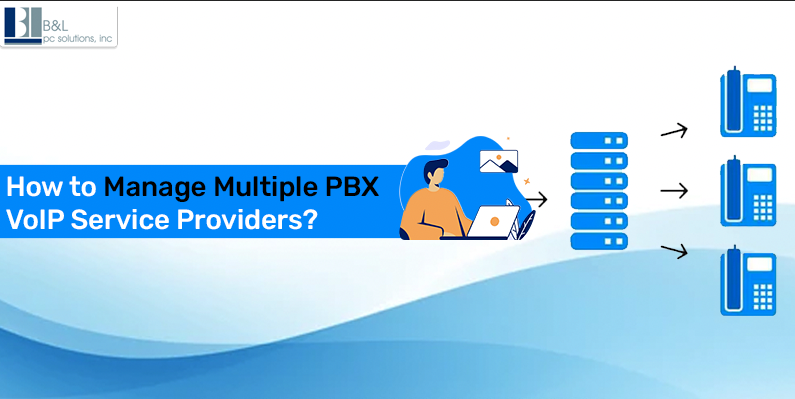
Everyone is dependent on technology, and so are our businesses, where communication is the topmost thing to take care of. For many companies, VoIP (Voice over Internet Protocol) has grown to be the best solution for scalable and value-effective phone conversations. And even as it’s common to use a PBX (Private Branch Exchange), VoIP companies, especially those offices with multiple locations or complex operations, rely on multiple service vendors to fulfill their diverse needs.
But here’s the trap: managing multiple PBX VoIP Phone Services on Long Island isn't always smooth. It involves juggling specific structures, contracts, billing systems, and support channels. Without the right oversight, this could quickly result in contract breakdowns, higher prices, and protection troubles.
So, how can your business successfully manage more than one PBX VoIP carrier provider at the same time as keeping your communication systems streamlined and stable? Let’s explore.
Why Businesses Use Multiple PBX VoIP Service Providers
Before we get into the how, let’s understand the why. Businesses may use multiple VoIP service companies for numerous motives:
- Geographical coverage: Different vendors may have better coverage or call quality in different regions.
- Cost optimization: Some providers offer lower international calling rates or bundled services for separate teams.
- Redundancy and reliability: Multiple systems can provide failover if one system experiences downtime.
- Specialized capabilities: One provider may offer call center features while another focuses on mobile app integration or CRM sync.
These advantages are attractive; however, managing them without a structured plan can lead to chaos. That’s where a strategic IT Managed Service Provider in Long Island comes in.
1. Centralized Management with an IT Managed Service Provider (MSP)
Managing special VoIP systems internally can crush your IT team, particularly if they’re also responsible for cybersecurity, infrastructure, and customer service. This is where partnering with an IT managed service provider on Long Island could make a good-sized difference.
A reliable MSP will:
- Monitor and maintain all your VoIP systems.
- Coordinate between providers on your behalf.
- Ensure updates and patches are applied uniformly.
- Manage QoS (Quality of Service) settings across networks.
They act as a single point of contact for all communication-related issues, saving your internal team time and effort.
2. Create a Unified Communication Policy
Even if your business uses more than one PBX VoIP system, the customer experience should feel unified. This requires a clear policy that outlines:
- How and when to use each system.
- Which teams use which provider.
- How integrations (CRM, email, messaging apps) are managed.
Your IT support services on Long Island can help implement and enforce these rules while ensuring all platforms align with cybersecurity requirements.
3. Standardize Hardware and Network Infrastructure
To reduce compatibility issues, standardize your communication hardware: headsets, phones, routers, and switches. Your network should also be optimized for VoIP traffic:
- Use VLANs to separate VoIP traffic from other data.
- Implement QoS to prioritize voice traffic.
- Monitor bandwidth usage regularly.
Computer consulting experts on Long Island can assess your network and recommend upgrades for optimal performance.
4. Leverage SIP Trunk Aggregation or SBCs
Consider using a Session Border Controller (SBC) or SIP trunk aggregator when managing multiple PBX systems. Benefits include:
- Seamless call routing between providers.
- Centralized call control and monitoring.
- Enhanced security and encryption.
5. Consolidate Billing and Contracts
Managing multiple invoices and contracts is inefficient. Assign someone or your MSP to consolidate and review all VoIP contracts. Look for:
- Overlapping or unused services.
- Hidden fees or premium charges.
- Opportunities to negotiate better rates.
Long Island IT support can assist in auditing and optimizing vendor agreements.
6. Monitor System Performance and Call Quality
Monitor the performance of all VoIP systems using metrics like:
- Call drop rates
- Jitter and latency
- MOS (Mean Opinion Score)
- Uptime percentage
Analytics tools can give real-time insights. Your IT MSP can then resolve issues quickly by coordinating with providers.
7. Train Your Team on VoIP Best Practices
VoIP systems work best when users are trained. Conduct regular training covering:
- How to access and switch systems.
- Security protocols like 2FA and encryption.
- Common troubleshooting tips.
Well-trained teams prevent many avoidable issues and boost productivity.
8. Ensure Data Compliance and Security
Multiple VoIP systems increase risks like:
- Data breaches
- Unsecured endpoints
- Misconfigured firewalls
Your Long Island IT consultants should conduct regular security audits and ensure compliance with standards such as HIPAA, PCI-DSS, or GDPR.
9. Plan for Disaster Recovery
Ask yourself:
- Do you have a backup VoIP provider?
- Can you reroute calls quickly?
- Is there a manual process for customer contact?
Your IT MSP can help you design a disaster recovery plan that keeps your business connected during outages.
10. Reevaluate Providers Regularly
Your needs evolve over time. Review providers regularly based on:
- Performance and reliability
- Cost-effectiveness
- New features or integrations
Computer consulting firms in Long Island can help you migrate between systems with minimal disruption.
Final Thoughts
Managing multiple PBX VoIP providers can feel overwhelming, but with the right strategy and support, it becomes a valuable way to streamline business communications.
If you need expert help, don’t go it alone. Work with experienced IT support teams on Long Island who understand complex communication systems.
Looking for expert guidance in VoIP and network management?
B&L PC Solutions offers full-service IT Managed Service Provider solutions on Long Island, including VoIP support, vendor coordination, and secure communication systems tailored to your business.
Tags: PBXManagement, VoIPSolutions, VoIPSupport





